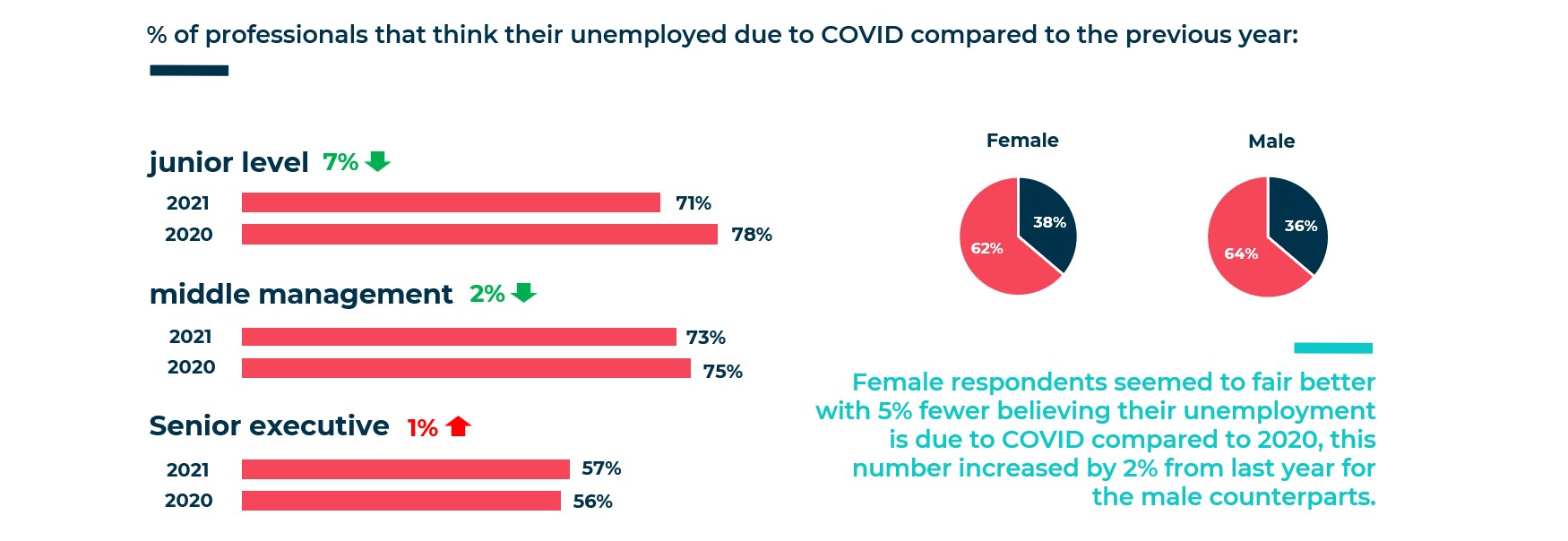As we continued to adapt to the transformation that the Global Pandemic brought, 2021 saw a lot of changing practices and attitudes across the sports industry from both employers and employees as we continued to define a new order in our continually evolving world, shaped by recent events. The Global Sports People Agenda, aims to connect, discuss and deliver focus around the key themes affecting the people of our industry and the 2021 edition of the People Agenda Survey supported this by understanding how we have been impacted, how we have adapted and how our industry is transforming. Here are the key insights from the people of our industry in a year of change.

COVID-19 continued to influence sports industry employment
COVID-19 has undeniably impacted the sports industry as well as the entire global jobs market since the pandemic began in 2020 and its presence continued to be felt widely throughout 2021, with a particular impact on unemployment. Of those surveyed and actively job searching, 63% citied COVID-19 as the reason for their current unemployment (down 2% from 2020). It has clearly played a significant role throughout the year in people’s employment status and impacted their attitudes to job searching or seeking a career move, particularly amongst more junior professionals that have been impacted the greatest.

This said, a positive outlook has been emerging throughout 2021 as the economy in many countries started to re-open and we began to see signs of job market recovery. This resulted in candidate attitudes towards job searching starting to shift in 2021 versus the previous year. 8% more employed respondents were actively looking for a job while we have seen a dramatic 27% increase in optimism to find a job amongst job seekers. This indicates clear positivity for the future and the emergence of recovery. We began to see the knock on impact of this shift towards the end of 2021, as employers increasingly looked to ‘re-build’ their workforces with a drive to attract new employees. This resulted in a surge in job vacancies with numbers reaching record highs in many countries. This means sports industry employers have been facing tough competition to attract the high quality candidates they need to fill their vacancies, as candidate demand sores.
Returning Career confidence and shifting job market
As the economy recovered, so did overall confidence of the people of the sports industry, providing an optimistic outlook during a turbulent period. 2021 saw a 20% increase compared to 2020 in employee confidence to retain their current jobs, whilst almost three quarters of those unemployed and actively job searching are optimistic about securing one. This, partnered with overall business confidence now being above the long-term average, represents a reversal of the uncertainty the pandemic imposed and creates the perfect market conditions for those considering changing roles or careers.
“Career Confidence has increased across the industry from last year. However previously high performing sectors such as Data & Tech have dropped while recovering sectors such as Media & Broadcast and Leisure & Fitness have risen.”
Termed “The Great Resignation”, this surge in confidence has resulted in record numbers of employees actively looking to or have changed jobs. Candidate attitudes are evidently changing, and this is a trend we are seeing across both gender and seniority. As employers battle to make hires as well as retain employees, wages have been rising at the fastest rate in 25 years. Whilst this is positive for employees, organisations are having to quickly evaluate and re-model their organisational practices and structures, with an increased emphasis on employer branding and their culture & values, as they compete for ‘in-demand’ talent, in a candidate driven market.
Being purpose driven is key to attracting the best talent
A purpose driven organisation stands for and takes action on something bigger than its products or services. In 2021, we witnessed this trend further gain traction in the sports industry, no longer being a concept that is isolated to start-ups and highly innovative companies. It has become a defining requirement that the people of the sports industry value the organisations they work for.
Employers must therefore focus on embedding and communicating a clear company purpose into their organisation in the year ahead, if they are able to attract and retain the best possible talent.

As workforces and workplaces have quickly evolved to manage the changes in the way we work, ‘company culture’ has become a primary focus and cannot be ignored if organisations are to thrive in the wake of the transformative changes taking place in recent times, changing people’s attitudes and values for ever. 84% of respondents highlighted a need to understand a company’s culture and values before working there, demonstrating that company values, culture and working environment are key considerations for employees when choosing the organisations they want to work for. People of the sports industry are less driven by the traditional benchmark employer incentives, such as salary or travel, and more concerned with clear personal and career growth paths, equality and diversity practices and flexible working structures. Ensuring companies align with the values of their employees and a culture that lives and breathes these principles is now fundamental in attracting quality employees and building a happier and more productive workforce.
A focus on well-being and mental health
Even before the pandemic began, employee mental health and well-being was becoming a focus area in the workplace, with an increasing number of organisations beginning to invest in mental and emotional well-being programmes. However, COVID-19 has been a driving force of bringing it to the forefront of employer attention. Whether it’s isolation and loneliness, changing routines, or the loss of family and friends, COVID-19 and its impact highlighted the fundamental importance of employee well-being and mental health and fuelled its significance as a topic in the workplace. With over 8 in 10 of those surveyed reporting it as an important aspect of work, organisations have needed to address mental health policies and ensure they work to support employees, build awareness of mental health, and break down the stigma. This may translate to offering mental health days, investing in mental health app subscriptions, or offering incentives to improve work-life balance.
“Mental health & well being support is a global effort, one that is strongly represented across diverse geographic countries and regions.”
Mental health and well-being was highlighted as specifically important to junior professionals, with nearly 9 in 10 seeing support from their employees as important. These are the future of our workforces, demonstrating it's important to get right. Organisations must listen and respond to their employees needs surrounding this topic in order to create a happy, healthy and motivated workforce. Furthermore, it is worth noting that this view is one that is shared globally, signalling to employers the importance of providing mental health and well-being policies, guidance and support, regardless of geography or ethnicity.
Defining the new working model
In 2020, for many across the world, working from home became the new normal. In 2021 we saw (for some) the return to the office, and with it the continued learning of organisations adapting to a new work structure. This presents a rare opportunity for businesses to reshape the future of work to accommodate the evolving attitudes of employees and prospective candidates, about how they want to work and what they want from employers. A key area to focus on will be accounting for employee flexibility. Whether it’s no commute and more focus time when working at home, or team culture and collaboration in an office environment, employees want to reap the benefits of a hybrid workplace and a balance of office and remote work going forward. There is increasing demand for individual autonomy over work schedules, to ensure working hours now accommodate employee personal lives, signally the importance to employers to revisit the structure of their working hours and environment and provide more of an individualised experience.
Organisations have had to address employees changing needs as they navigate the future of the workplace, to ensure they are able to attract and retain the right candidates. The fact that only 55% of those surveyed felt their sports industry organisation successfully adapted to remote working, emphasises how there is still work to be done in the year ahead for employers when defining this new way of work.
Increasing appetite for personal and professional development
COVID-19 resulted in the people revaluating their career paths due to more time to think about their long-term goals and how they might reach them. This has resulted in changing career attitudes and an increase in employees looking to advance their personal and professional development to meet these changing career priorities. However, sentiment among those in the sports industry suggests organisations still have work to do. Only 58% of those surveyed reported receiving excellent or good learning and development from employers, a gap organisations need to bridge to meet changing employee attitudes towards their career development, and the role employers must now play in this journey.
Now more than ever, upskilling is a crucial component of the workplace. It now plays a central role in future-proofing businesses to remain competitive, ensuring employees are developing a continually applicable skillset, and in turn builds loyalty and employee advocacy. From increased employee satisfaction by showing your staff you value them and are investing in them as individuals, to attracting new talent by demonstrating you’re committed to professional development and the opportunity to advance their career, we are seeing ‘upskilling’ bring considerable benefits to organisations while building more productive, happy teams.

With mentoring opportunities and better access to sports industry networking the most sought-after prospects, it’s essential for companies to take effective action and prioritise implementing these opportunities if they are to remain competitive in the year ahead and beyond.
Like all the insights outlined here, failure to take action, adapt and rapidly evolve, is no longer an option. The stakes are too high in a candidate empowered market. The risk of losing high quality talent to more 'attractive' employers is very real and highlights the importance of listening to your audiences and providing current and future employees the value they require to thrive in this new and evolving way of working.


